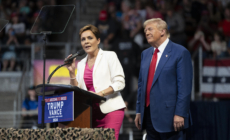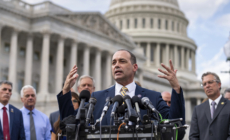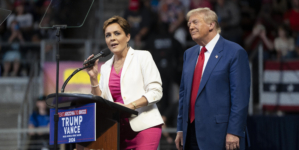-
Mark Zuckerberg’s Meta Donates $1 Million to Trump’s Inaugural Fund - 16 mins ago
-
Today’s ‘Wordle’ #1,272 Answers, Hints and Clues for Thursday, December 12 - 20 mins ago
-
Nike and NFL Aim to Boost Global Reach with Decade-Long Collaboration - 55 mins ago
-
In Aleppo, Jubilant Syrians Return to a Ravaged City and Toppled Monuments - 59 mins ago
-
Donald Trump Announces New Role for Kari Lake - 2 hours ago
-
Dean of Students at Massachusetts School Charged With Conspiring to Traffic Cocaine - 2 hours ago
-
Outgoing House Republican: ‘The Less’ Congress Does, ‘The Better’ - 2 hours ago
-
Syria’s New Leaders Balance Huge Struggles Amid Disorder - 2 hours ago
-
Back-to-Back Bomb Cyclones Could Hit US - 3 hours ago
-
South Korea President Yoon Defends Martial Law Decree in Defiant Speech - 3 hours ago
Workplace Incivility Spikes Around Elections, Expert Says at Newsweek Event
Talking politics at work can be a recipe for disaster—the topic is full of potential pitfalls that could lead to workplace arguments or serve as a drag on productivity. These distractions and their related turnover or absenteeism risk could also cost employers millions of dollars.
To help ensure that workplaces remain civil, a Newsweek Horizons event sponsored by the SHRM (Society for Human Resource Management) recently brought together a panel of medical, legal and social psychology experts to discuss the dicey issue of talking politics at work.
Newsweek Workplaces Editor Aman Kidwai moderated the discussion, entitled “Better Workplaces: How to Foster Inclusion and Civility,” at the media company’s World Trade Center headquarters in New York City on Tuesday, December 10. Onstage participants included Stephen M. Paskoff, president and CEO of ELI; Gabriella Rosen Kellerman, MD, BetterUp’s chief innovation officer and leader of BetterUp Labs; professor of psychology and neuroscience at the University of North Carolina at Chapel Hill Dr. Kurt Gray; and Michael Franklin, the executive director of Speechwriters of Color.
The event took place little more than a month after the 2024 election that saw President-elect Donald Trump win a second nonconsecutive term in the Oval Office. In the highly divisive political climate of the national election, workplaces were bound to be impacted by employees who couldn’t help but bring their politics to the office.

Marleen Moise
In his opening remarks, Jim Link, SHRM’s chief human resources officer, said that U.S. workers experience 223 million acts of incivility per day, and that recently the majority of those stem from political divisions and political discourse.
“Now we thought that once the election was over, that tide might change a little bit and it actually might start to ebb somewhat. But our ongoing research, unfortunately, tells us something a little bit,” he said. “What that research tells us is, in fact, that over the course of the year, incivility has increased—by the whopping number of 30 percent since we began tracking this in the first quarter of 2024.”
Link added that this incivility is costing U.S. businesses via its impact on workers’ well-being, sense of belonging, performance and retention.
“Collective data reveals that we could be suffering up to a daily loss of $2.7 billion,” he said, “due to reduced productivity and absenteeism.”

Marleen Moise
Gabriella Rosen Kellerman also pointed to data that buttressed the connection between losses in productivity and employee well-being around the timeframe of “spiking political events.” Her firm, BetterUp, has compiled data from the past three U.S. election cycles—in 2020 and 2024, but also the midterms in 2022—and compared scores reflecting employee well-being in election and non-election years.
“We’ve been able to quantify significant drops in both well-being and productivity,” she explained. “For employees at work during those election weeks, we estimated translating this into absences, using the Bureau of Labor Statistics data, and converted it to roughly $900,000 of lost productivity per week around these spikes, particularly around elections, for about 10,000 employees.”
Rosen Kellerman said that beyond employee well-being and productivity, there are negative impacts of political tension at work on team collaboration, mental health and on a sense of belonging, which is especially “one of these things that becomes so deeply threatened when we feel politically polarized against those in our workplace, in particular our leaders or those who are in power.”

Marleen Moise
Stephen Paskoff elaborated on how business leaders are feeling in the face of increased workplace polarization: “They’re confused. By a lot of things.”
He also discussed how political topics at work can be just as highly charged as conversations about race, gender, religion, age, national origin, disability or sexual orientation. These topics have become even more fraught in recent years, he added.
“One other thing that’s happened in the last four years, eight years,” he explained, “there are so many ways now to antagonize people and we need to face up to it, email, voicemail, text, posting, you name it.”
Paskoff took a moment to reflect on how many people spend more time at work than at home, necessitating that the workplace be a space with a common mission, vision and values. Organizations should be “activating those values, just like they do safety,” he said.
Safety was an important topic for the panel on Tuesday night. There were discussions on how political divides could impact vulnerable employees, such as transgender individuals, and how workers who feel unsafe could have a negative impact on productivity.
Dovetailing with the issue of safety, Kurt Gray explained how there are real differences in what sort of perceived harm people are most concerned about.
“We even disagree about who’s especially vulnerable to harm. Brian Thompson, the CEO who was recently murdered, folks who are very progressive tend to see those in power positions as not being vulnerable to harm,” Gray said. “Folks who are more on the right, they see those folks in power as being more vulnerable to harm. And so you get these really kind of divergent world views based on media bubbles based on social media and so forth.”
The recent homicide of the UnitedHealthcare CEO was not the only news item that the panelists pointed to in order to illustrate their calls for ensuring that workplaces foster employees who feel included and protected.
Michael Franklin looked to Washington, D.C., for an example of why it is important to address political conversations in a way that anticipates how employees might have to confront the realities of contemporary policies. To him, newly elected Representative Sarah McBride, the first transgender person elected to Congress, embodies the sort of discussions workplaces should have.
“On one hand, you may have folks who are like, ‘Let’s just not talk about that. That’s not going to impact our business because we might not have a trans person on our team,'” he said. “However, the issue is that for businesses that may have a trans person on their lobbying team who suddenly has to go to the Capitol, those new laws and those new standards impact your people that are at your company, that are a part of your organization, and suddenly you have to take into consideration, are you keeping your employees safe?”

Marleen Moise
Dr. Jerome Cohen, president of the Medical Society of the State of New York, attended the event and was struck by how the discussion aimed to improve people’s lives beyond the workplace.
“What I will relate to is that most people spend more of their time in the workplace than they do at home,” he said. “And so if you can improve their workplace, you can improve their lives. And again, since there’s so much more time in the workplace, there’s much more of an opportunity to impact people.”
Amy de Jong, the manager of talent development at Training the Street, which teaches business and finance fundamentals, echoed Cohen’s take on the event.
“If everyone in this room goes back to their workplace and is bringing these tools and the concepts and this kind of perspective, and can help better their workplace,” she explained, “I do think that eventually can have a ripple effect to better the world.”
Others were impressed with how the panel focused on actionable steps that business leaders can take to make their workplaces function better.
“I think what stood out to me most was everyone’s response [on] how to navigate the workspace in times of political turmoil or challenges, and how to keep a workforce united and forward in a mission,” said Darwin Garcia, senior project manager at nonprofit Color of Change. “I think for me, in my capacity, which involves a lot of strategic initiatives…it was really good to hear from these experts on ways to keep your team motivated.”

Marleen Moise
At the end of the event, Newsweek and the Stubblefield Institute, which focuses on increasing the civility of political communications, announced the recipients of the 2024 Civility Awards, which honored individuals and organizations that prioritized respectful discourse in Washington, D.C., and beyond.
This year’s winners included Senator Debbie Stabenow from Michigan and C-SPAN’s Sam Feist, both of whom won lifetime achievement awards. Senators Shelley Moore Capito of West Virginia and Chris Coons of Delaware both received awards, as did representatives Brenden Boyle of Pennsylvania and Young Kim of California. State- and community-level award recipients included Utah Governor Spencer Cox and Eboo Patel, president of InterFaith America. The philanthropist Kettering Foundation was also honored with an award.
“Civility isn’t about diluting our beliefs or avoiding conflict,” Newsweek Executive Editor Jennifer Cunningham said in remarks about the awards. “It’s about disagreeing without disrespect, debating without demeaning and engaging without enmity. It’s about finding common ground and fostering an environment where constructive conversations can flourish.”
Newsweek reporter Lauren Giella contributed to this article.
Source link




















